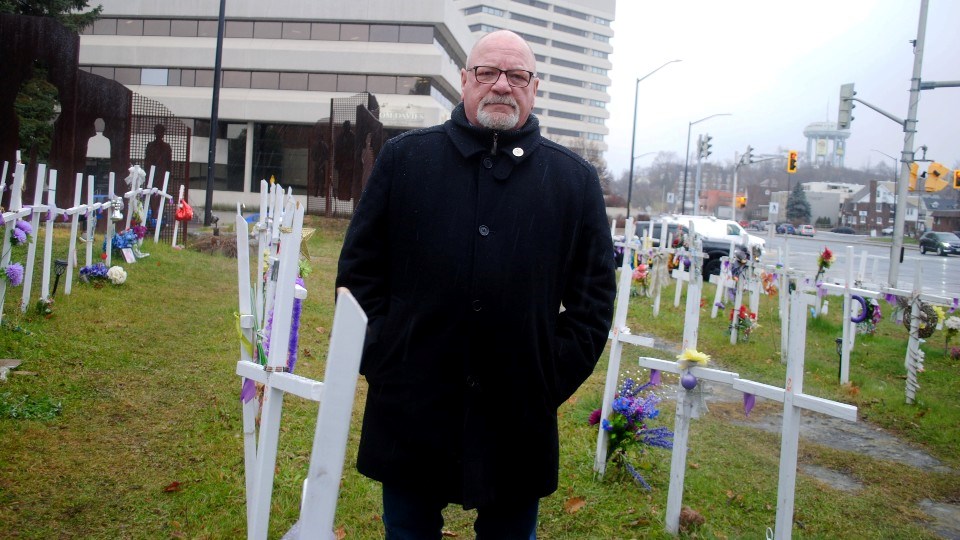When it comes to Greater Sudbury’s homelessness and opioid crises, neither Premier Doug Ford nor Health Minister Christine Elliott are picking up the phone.
This, Mayor Brian Bigger said, has him feeling “ghosted.”
“He refuses to talk and his ministers refuse to respond or provide funding that we need in our community,” he said. “This is really a sad state when there is no response.”
Earlier this week, Bigger penned an open letter to the premier in which he requests the province’s support and affirms that he’s available to discuss matters at any time.
“This is about the City of Greater Sudbury having the highest per-capita (opioid) death rate in the province … and not even getting the courtesy of a callback from the minister of health,” he told Sudbury.com.
It’s not as though there isn’t any money available, Bigger said, noting that the province managed to find $6 billion to spend on Highway 413 in the Greater Toronto Area.
“That’s just not acceptable,” he said, adding that the city has been pushing for the province’s help for the past two years.
“You try to work in a positive manner with the government in power, you try to work with them, but I’m really getting concerned. As we come closer to the election, the things they’re focusing on are a road in the GTA? And they’re dead silent in response to opioids and mental health.”
Bigger met with Sudbury.com to discuss his letter on Thursday at the Crosses for Change memorial near Tom Davies Square.
At the latest count last month, there were 214 crosses set up at the corner to mark those who have died by overdose thus far in the pandemic.
Officials from the Ontario Medical Association drew attention to the site in October, at which time they pledged their advocacy. The organization released their prescription for Northern Ontario the following day, which pushed for “equitable access to health care” for Northern Ontarians, whose life expectancy is more than two years shy of the provincial average.
At the time, Ontario Medical Association president Adam Kassam said Greater Sudbury alone is short approximately 40 psychiatrists, 100 family doctors and 130 specialists and that various other northern communities are also underserved when it comes to health care.
“The premier is not listening to the experts,” Bigger said. “He’s not listening to the best medical advice available to him as premier.”
Bigger’s letter urges Ford to commit “immediate attention and assistance” to help Greater Sudbury deal with the converging crises of homelessness and drug use.
The number of people living in encampments, while down in recent days as winter weather sets in, has increased significantly since the pandemic started and is “unlike anything this community has faced before.”
Earlier this week, it was estimated that 90 people are currently living unsheltered in an encampment within Greater Sudbury.
“There are currently 65 emergency shelter beds operating within the City for Greater Sudbury split amongst three locations,” Bigger wrote. “Housing-based solutions continue to be the primary focus based on individualized case plans to meet each person’s needs.”
Although Bigger maintains that health care is, and should continue to be, the responsibility of the province, he said, “we’re getting no response whatsoever.”
Rather than continue waiting on a provincial funding commitment, city council has pushed forward with projects in hopes the province will eventually fill the funding gap.
One of these projects is a transitional housing complex for the chronically homeless to consist of between 28 and 60 units. The federal government has pledged $7.4 million for the project and the city is prepared to fund an Assertive Community Treatment Team of health-care professionals to staff the facility.
Although the project carries some uncertainty due to opposition from residents of the Lorraine Street neighbourhood, where city council opted to locate the clinical facility, municipally funded team members are currently being onboarded by Health Sciences North to work in temporary locations until a permanent location is operational.
The team includes a wide swath of medical professionals such as nurses, a social services worker, addictions workers, a psychiatrist and a general physician. The facility’s projected annual operating cost is $2.24 million, of which $1.74-million is comprised of staffing.
The city is also moving forward with a supervised consumption site at Energy Court in downtown Greater Sudbury, which is expected to open in March.
Greater Sudbury city council committed $1.1 million per year toward the temporary supervised consumption site earlier this year in addition to no more than $800,000 in setup costs.
The site, endorsed by Sudbury Medical Officer of Health Dr. Penny Sutcliffe, will offer an indoor environment for people to inject drugs while being supervised by medical professionals.
Bigger’s letter requests the province commit $2.4 million per year to support the transitional housing complex, $1.3 million per year to support the supervised consumption site and additional funding to support various other municipal efforts to address homelessness and drug use in the community.
“While council has taken these programs on the municipal levy, these are health supports that should be funded through the appropriate ministries,” the letter reads before concluding with Bigger clarifying that the city “urgently” needs the province’s support “to make this a truly effective and successful effort.”
In conversation with Sudbury.com at the Crosses for Change memorial site, Bigger was a bit more blunt.
“People are dying every week,” he said, adding that the province appears to be flying under the radar because they don’t want to be pulled into a conversation about it.
“Somebody at a higher level is not allowing the funds to flow and not wanting to enter in the conversation.”
Sudbury.com reached out to the offices of Premier Doug Ford and Health Minister Christine Elliott for comment on Thursday but did not receive a response by the end of the day.
Tyler Clarke covers city hall and political affairs for Sudbury.com.
